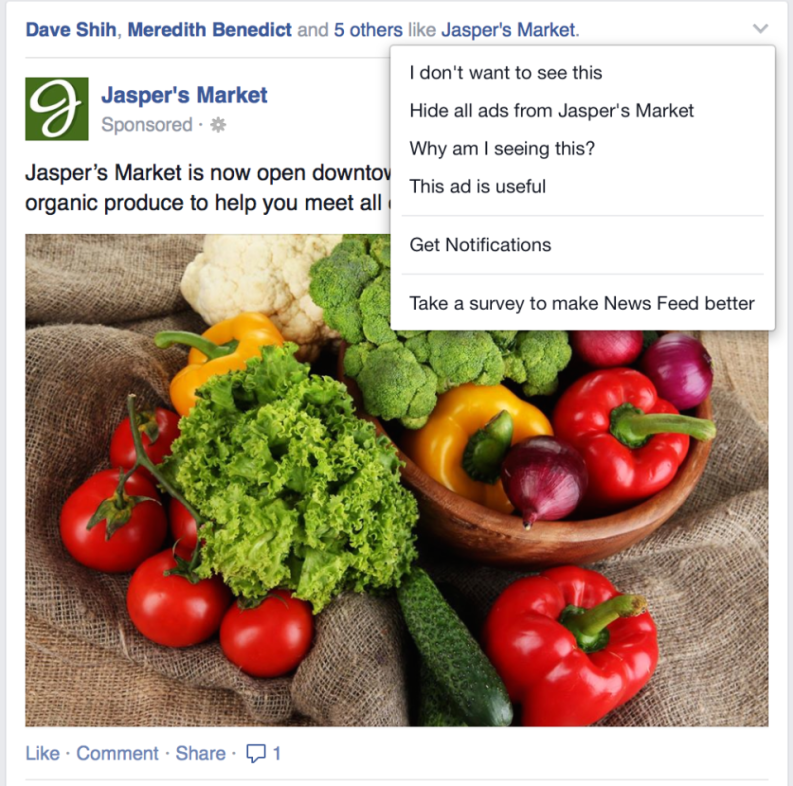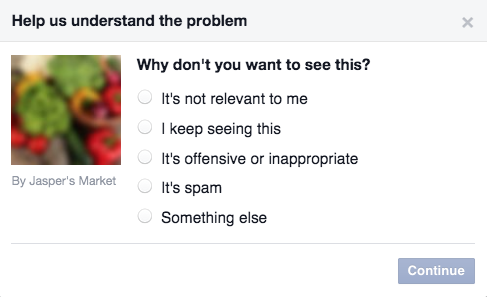By Max Eulenstein, Product Manager
Every day, there are millions of ads that are eligible to be shown in News Feed from more than 1.5 million active advertisers on Facebook, and our goal is to show people ads that we think they’ll find interesting. When someone sees an ad that is relevant to them it’s a good experience for them as well as the marketer trying to reach them.
So, today we’re announcing two updates to News Feed to help show people more relevant ads. For years, we have given people the choice to hide an ad so they no longer see it in their News Feed. We’ve also looked at these hides and used them as a signal that other people on Facebook might not want to see that ad. Now, we are going a step further by taking into account the specific reason they didn’t want to see that ad, and use that as a signal to inform whether or not we show the ad to other people. Second, we’re going to pay more attention to feedback from people who don’t often hide ads so that when they do give us feedback we take it as a stronger signal.
Diving deeper into why people hide ads
Everyone has the ability to hide any story in News Feed, and that includes ads. From the menu on the top right of every post you can select ‘I don’t want to see this’. Whenever someone tells us that they don’t want to see certain stories, including ads, we try to show them fewer stories like the one they don’t want to see.

Now, after someone tells us they don’t want to see a story, we also ask why.

We’ve learned that the reason why someone hides an ad can be just as important as the hide itself. If someone doesn’t want to see an ad because it’s not relevant to them, we know we didn’t do a great job choosing that ad and we need to improve. If someone doesn’t want to see an ad because it’s offensive, it probably isn’t a good ad for other people on Facebook, either.
With this update, News Feed is going to take into account the reasons why people give us for hiding an ad. When we identify an ad like this, we’ll show it to fewer people on Facebook.

When testing this update, we looked at when people told us that ads were offensive or inappropriate and stopped showing those ads. As a result, we saw a significant decrease in the number of ads people reported as offensive or inappropriate. This means we were able to take signals from a small number of people on a small number of particularly bad ads to improve the ads everyone sees on Facebook.
Listening more closely to those who rarely speak up
We know that a small group of people share feedback less frequently than others, and this is especially true for ads. So, we’ll now weight feedback differently based on how often someone hides ads and other content in their News Feed. If someone hides things very rarely, we’ll consider that when we choose what to show them. If we think there is even a small chance they might hide an ad, we won’t show it to them. This affects the type of ads we show everyone, but has a bigger impact for people who don’t often hide ads.
When testing this update, we saw that people who rarely hide ads ended up hiding 30 percent fewer ads with this change – meaning when we listen carefully, this feedback helps us show better ads – even to those who aren’t very vocal.
How will this affect advertisers?
Most advertisers will see no change to the delivery of their ads or how their ads perform on Facebook. These updates are designed to affect the ads that a small set of people give us negative feedback on, and allow us to show people ads that we think are most relevant for them, and make sure advertisers are getting their messages in front of the right people.
We’ll continue listening to feedback and improving the ads people see on Facebook.